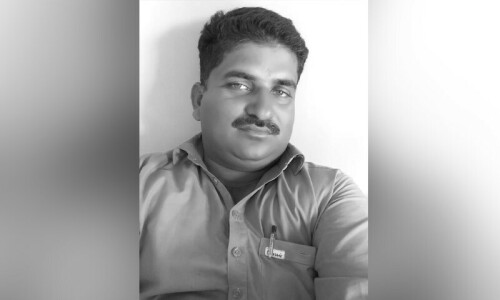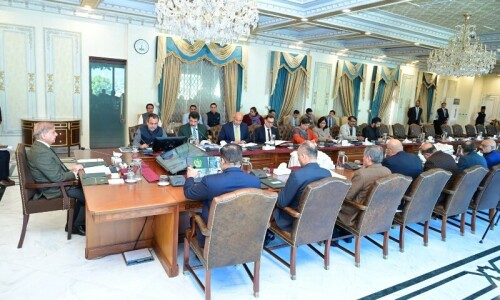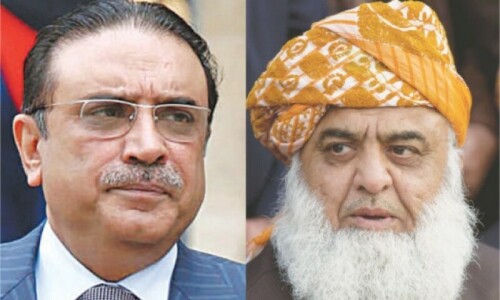A GIRL student of mine, a South Korean by nationality, had become much interested in Urdu. She was doing a certificate course at Karachi University’s Urdu department and was doing quite well but sometimes stumbled on certain syntactical variations that Urdu has. Another problem was that every so often she could not follow slightly different Urdu accents, particularly if someone spoke fast.
For improving listening comprehension, I advised her to watch Urdu programmes aired by our channels, especially the ones that gave cooking lessons, since she loved Pakistani food and often cooked it. But she smilingly said, “Do you know what language they use? It goes like ‘water lein, us ko boil karen, us mein salt add karen’, what kind of Urdu is that and what can I learn from it?” I was stunned as it was a succinct commentary on our national spirit — or, rather, lack of it — and our linguistic attitudes. It made me wonder what to suggest for listening comprehension as Urdu FM radios were even worse. But as a ‘damage control strategy’, I replied in the lighter vein that the language used by our Urdu channels was a hybrid of Urdu and English, name it ‘Urdish’ or ‘Engdu’.
But jokes aside, some of our TV hosts use a variety of cross-breed language that is packed with English phrases and only a tiny minority of Pakistanis understands it fully. Some TV reporters while interviewing people in the street often ask questions in a language that the latter cannot understand because of its English vocabulary and they either stare at the camera, clueless and embarrassed, or reply only when the question is rephrased in a comprehendible Urdu. It was observed in particular during the floods last year when TV anchors left their talk-shows behind and began on-the-scene reporting. It was great, no doubt. But the problems rose when microphone-totting, jeans-wearing anchors with dark eyeglasses wanted to elicit answers from some simple-looking villagers in a lingo understood only by a section of townspeople watching TV in their living rooms. Does Pakistan consist only of big cities like Karachi, Lahore and Islamabad? Did the majority of target audience understand this mumbo-jumbo? Many flood victims from remote areas could barely speak Urdu, let alone answering the question asked in ‘Engdu’ or ‘Urdish’. With due apologies, some of our woman anchors especially try to impress viewers with a language most of which consists of English words or even sentences. Such programmes are understood by a small section of society as the common viewer resorts to channel-surfing.
This kind of callous and insulting behaviour towards common people is not limited to TV crew only. Our society now has become so dichotomised on the basis of class differences that there is a vast chasm between the cultural and linguistic behaviour of different sections of society. Many professionals use a language or a mixture of languages that suits them. It is fine as long as it does not bother anybody and, especially, does not create a gap in communication. But some professions, such as medical services, demand that the language used must convey the message as clearly and as unambiguously as possible because any gap in the communication may prove fatal. But the language used by most doctors and paramedics can at best be called ‘Urdu pidgin’, for it is loaded with medical jargon in English that less educated patients and their attendants do not comprehend. As a result, some patients are at the end of their wits as they do not exactly understand what disease they suffer from and what treatment they are to follow. Believe me, one of my friends was asked by his businessman friend to go along with him to the hospital where his father was admitted and ascertain after talking to doctor what exactly had happened to his father and what kind of medical procedure was to be carried out on him.
Medical professionals should realise the other kind of agony their patients go through because of the language they use unmindfully. Similarly, Urdu TV channels must think over what segment of the society they are trying to communicate with, only a tiny percentage of the population or the masses? The marketing and advertising agencies must take stock of the percentage of the viewers that understands the messages aired through the channels that use an arcane version of Urdu.
Even PTV is aping the new channels and beautiful Urdu words it has been using for some 40 years such as ‘waqfa’ and ‘naazreen’ have been replaced by ‘break’ and ‘viewers’. At the Urdu conference organised by the Arts Council last year, someone had rightly pointed out that some anchors could not even pronounce some English words properly e.g. they consistently use the word ‘weavers’ instead of ‘viewers’.
It will take perhaps many more pieces like this one to write about Urdu programmes named in English, tickers written in Roman Urdu and the orthographic and grammatical errors made by these Urdu channels. The horrible Urdu pronunciation is a different story. So forget it, at least for now, and keep your fingers crossed that at least some sense prevails at these so-called Urdu channels that are slaughtering Urdu, day in day out.
drraufparekh@yahoo.com














































Dear visitor, the comments section is undergoing an overhaul and will return soon.